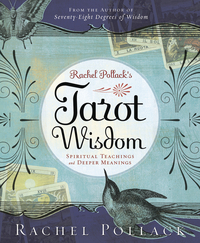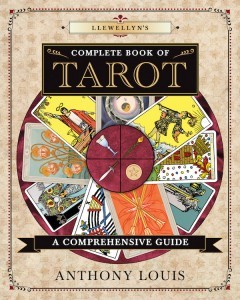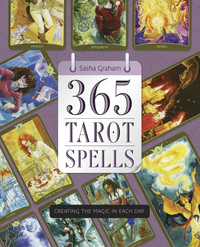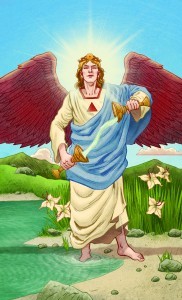Llewellyn Publications's Blog, page 53
May 30, 2016
Cutting Energetic Cords with Archangel Michael
Readers, please enjoy this guest blog post by Tanya Carroll Richardson, author of the new Angel Insights.
 Energetic cords are invisible energy bonds stretching through time and space that connect you to people, organizations, places, ideas, situations, issues, or patterns. These cords can simply mean that certain folks or groups or patterns are part of your life. But what about groups or patterns or relationships you want to move on from, shift, or heal? As we take action steps on the material plane to move on from, shift, or heal a relationship or pattern, it’s very powerful to combine those efforts with energetic work like cord cutting. My book Angel Insights has more information about cord cutting, as well as many other energy-clearing exercises you can try.
Energetic cords are invisible energy bonds stretching through time and space that connect you to people, organizations, places, ideas, situations, issues, or patterns. These cords can simply mean that certain folks or groups or patterns are part of your life. But what about groups or patterns or relationships you want to move on from, shift, or heal? As we take action steps on the material plane to move on from, shift, or heal a relationship or pattern, it’s very powerful to combine those efforts with energetic work like cord cutting. My book Angel Insights has more information about cord cutting, as well as many other energy-clearing exercises you can try.
Archangel Michael is a protector. Why call on him for cord cutting? Nothing intimidates this guy. Bring him your messiest relationships, your darkest phobias, your most stubborn patterns, your severest wounds with loved ones. And did I mention he has a sword of light? He’ll be using it in our cord-cutting exercise below. The moment you call on Archangel Michael he’ll be by your side—he’s extremely loyal and reliable.
(For this exercise, go to a quiet room where you can be alone and shut the door.)
Call on Archangel Michael by saying, “Archangel Michael, please help me cut a cord today.” If you are sensitive to energy you will feel an energetic shift in the room—that is just Archangel Michael and his significant presence!
Think of the person, place, idea, pattern, situation, organization, or issue with which you want to cut cords. Tell Archangel Michael, out loud in a calm, soft voice, with whom or what you want to cut cords. You might say, “Archangel Michael, help me cut any energetic cords I have, from this life or past lives, to the idea of me living in poverty.” Or, “Archangel Michael, my dear friend and I got into a nasty fight. Can you help me cut the cord that represents this fight?”
Tell Archangel Michael about this cord, and why you want it cut. Maybe part of you longs for adventure and change, yet you are having trouble moving away from the place where you grew up (your cord is with your hometown).
Tell Archangel Michael how you hope cutting the cord will help. Maybe you hope cutting the cord between you and your ex will help you begin to heal, work through your emotions, and energetically enable you to attract a new partner.
(In this next section of the exercise, read one step, close your eyes and imagine it, and then open your eyes to move on to the next step.)
Think of this person, place, idea, pattern, situation, organization, or issue with which you share a cord, and imagine in your mind what the cord looks like. What color is the cord? What material is it made of? Is it thick (possibly indicating that the cord is very old or very strong) or is it thin and wispy (maybe this cord isn’t too intense anymore)?
Now get a mental image of the person, place, idea, pattern, situation, organization, or issue with which you share this cord. Imagine that this cord is connected to both of you. See it starting at your stomach or heart and stretching to the person, place, idea, pattern, situation, organization, or issue with which you share it.
Next, picture Archangel Michael with his enormous feather wings and mighty sword of light. He smiles at you lovingly, then raises his sword and in one quick movement severs the cord. It vanishes! Little bursts of colored light fill the space where the cord used to be. Archangel Michael hugs you, and then flies off.
You could feel differently—lighter, emotional, tired—after this exercise. These feelings will balance out over the next few days. If a cord is formidable or old you can repeat the exercise in a week or two.
Our thanks to Tanya for her guest post! For more from Tanya Carroll Richardson, read her article, “11 Magical Ways That Angels Send You Guidance.”
May 25, 2016
The Words on the Wheel of Fortune
One thing many students of tarot find fascinating is learning what some of the mysterious symbols on the cards mean. During the Renaissance, when the tarot was invented, people were largely illiterate and were therefore very literate in symbol recognition. Their churches told the stories of their faith in stained glass and granite images. These days, we as a culture lack a shared symbol system and even the popular Rider Waite Smith tarot includes many symbols that are meaningless today. Meaningless until we unearth the meaning.
In Rachel Pollack’s brilliant Tarot Wisdom, she casually and conversationally reveals many symbolic meanings. If you are looking for an enjoyable and readable book on tarot symbols, this book is for you. You can read more or order HERE:
The Wheel of Fortune contains a message about the nature of tarot, one that gives us a clue regarding the wisdom within the cards and the proper usage. Pollack says this about the strange letters found on the Wheel of Fortune:
The four Roman letters illustrate how if we see life as a wheel, we get so many more possibilities than if we consider it a straight line. Starting at various points and going in either direction but staying in order, we can find various four-letter words in different languages. Here is a sentence from MacGregor Mathers, co-founder of the Golden Dawn: ROTA TAROT ORAT TORA ATOR. The Wheel (Latin rota) of Tarot (tarot) speaks (Latin orat) of the law (Hebrews Tora, usually spelled Torah) of Love (from Ator, or Hathor, an Egyptian goddess akin to Aphrodite).
May 24, 2016
Are You a Sensitive Empath?
Readers, please enjoy this guest blog post by Dr. Kyra Mesich, author of the new Strength of Sensitivity.
 I’ve dedicated my holistic psychology career to helping sensitive people. It shouldn’t surprise you that I’m highly sensitive; part of this quest has been to understand myself. I used to be a typical sensitive kid and young adult. I cried easily, got overwhelmed in loud or crowded environments, and the emotions of other people would sometimes exhaust me. Even after attending grad school for psychology, I still had no better understanding of why I was so sensitive and uncomfortable much of the time. Although we may go to universities to learn, it is life that presents us with our biggest lessons.
I’ve dedicated my holistic psychology career to helping sensitive people. It shouldn’t surprise you that I’m highly sensitive; part of this quest has been to understand myself. I used to be a typical sensitive kid and young adult. I cried easily, got overwhelmed in loud or crowded environments, and the emotions of other people would sometimes exhaust me. Even after attending grad school for psychology, I still had no better understanding of why I was so sensitive and uncomfortable much of the time. Although we may go to universities to learn, it is life that presents us with our biggest lessons.
Early in my career as a young psychologist, it became all too clear to me that I was empathic. The standard definition of an empath is an individual with the psychic ability to perceive, absorb, and directly experience the strong emotions and/or intense physical sensations of others. Guess how that went over as I worked with many varied clients in the throes of emotional pain and confusion? I had to stop working for a while in order to figure out what was happening to me, what empathic ability was all about, and most importantly, how to regulate it.
On one hand, I was lucky to be a psychologist, because it gave me the opportunity to sit with each client and know exactly what they were thinking and feeling. I was therefore able to confirm without a doubt that I was indeed empathically picking up on their energies. It can be challenging being an empathic healer.
But it is also challenging being an empath anyplace else—in the office, at school, in your family—because in those situations, people often hide their true feelings. So how can you know when you are experiencing your own emotions vs. empathically picking up on the feelings of others?
This was the big question I wanted to answer, and through interviewing hundreds of people, I made the connection that sensitive people are empathic. If you consider yourself to be sensitive, or if you’ve had to hear people tell you that “You’re too sensitive,” then you are also an empath.
It’s this misunderstood empathic ability that often leads us to feel overwhelmed or overly emotional as sensitive people. We try to figure out “what is wrong with us,” when actually we are feeling what’s wrong with everyone else.
The first step to regulate empathic ability is to accept that it exists. It isn’t unusual or spooky. It is simply a nonverbal way that we communicate with each other, which has been buried in modern society in favor of intellectual communication.
The next step is to take care of ourselves by healing our own wounds and issues, so they do not get entangled with the emotional energy we sense empathically. I discuss more about this in my book The Strength of Sensitivity. Empathic ability is actually a lot more common than you might think and provides very useful information when it is balanced.
Our thanks to Kyra for her guest post! For more from Dr. Kyra Mesich, read her article, “4 Secret Strengths of Sensitivity.”
May 18, 2016
The Cards as Living Entities
In just a few months (August, to be precise), Llewellyn’s Complete Book of Tarot by the knowledgeable experienced, and delightful writer Anthony Louis will be available.
He covers the subject of tarot as completely as a concise overview allows and does so objectively, presenting background on the history of tarot as well as the various traditions. Throughout the book, he highlights some important gems from some of tarot’s most influential practitioners.
In this excerpt, he shares an important observation by Aleister Crowley. Many people may miss Crowley’s wisdom because of his reputation. That is too bad because this is important stuff. Too many people think that by reading enough books or downloading enough lessons, they will absorb what they need to become great readers. But there is so much more to reading the cards than just their interpretations. The cards interact with each other in a spread and with us in our daily lives, if we only pay attention.
From the forthcoming Llewellyn’s Complete Book of Tarot (learn more or pre-order HERE):
The Cards as Living Entities
The notorious occultist Aleister Crowley has compared learning the tarot to making a new set of friends. Viewing the cards as living individuals, Crowley suggests methods that enable students to form personal relationships with the entities of the tarot. The view of the individual cards as living beings may seem a bit far-fetched, but it is not so different from the Jungian view that the tarot signifies universal archetypes of the collective unconscious.
Crowley believed that newcomers to the tarot can truly appreciate the cards only if they observe closely how the tarot behaves over a substantial period of time. In other words, an understanding of the tarot comes only through extensive experience with the cards, treating them as if they were sentient beings. How do you get to Carnegie Hall? Practice, practice, practice!
Crowley cautions that merely intensifying one’s study of the cards as “objective things” rather than as “living individuals” is not sufficient. The student must live with the cards, and the cards in turn must live with the student. The tarot novice and the living cards must take the time to get to know one another. How else can a relationship form and grow?
To quote Crowley verbatim: “A card is not isolated from its fellows. The reactions of the cards, their interplay with each other, must be built into the very life of the student. … How is he to blend their life with his? The ideal way is that of contemplation. … The practical every-day commonplace way is divination.”[1]
Occultist Dion Fortune carried Crowley’s “cards-as-living-entities” metaphor even further, suggesting that students sleep with their cards, much like young lovers who spend nights together exploring every nook and cranny of each other’s bodies.
[1] Aleister Crowley, The Book of Thoth, Appendix A, (San Francisco, CA:Weiser, 1969), p.249.
May 16, 2016
Magickal Scavenger Hunts
Readers, please enjoy this guest blog post by Melanie Marquis, author of A Witch’s World of Magick, The Witch’s Bag of Tricks, the forthcoming Modern Spellcaster’s Tarot (available in September), and co-author of the new Witchy Mama.
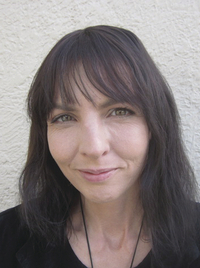 The weather is warming and the flowers are blooming, inviting us to get outdoors and bask in the beauty of nature. For parents, it’s a time of relief as we can finally give ourselves as well as our children that much-needed fresh air and freedom we long for after the often insatiable boredom of huddling indoors throughout winter’s bitter chill. Spending time outside centers us and relaxes us, recharges and rejuvenates us. It keeps us in touch with the magickal world and strengthens the magick that lives within us. One fun way to celebrate the sunshine and simultaneously build up your psychic skills and witchy abilities is with a magickal scavenger hunt.
The weather is warming and the flowers are blooming, inviting us to get outdoors and bask in the beauty of nature. For parents, it’s a time of relief as we can finally give ourselves as well as our children that much-needed fresh air and freedom we long for after the often insatiable boredom of huddling indoors throughout winter’s bitter chill. Spending time outside centers us and relaxes us, recharges and rejuvenates us. It keeps us in touch with the magickal world and strengthens the magick that lives within us. One fun way to celebrate the sunshine and simultaneously build up your psychic skills and witchy abilities is with a magickal scavenger hunt.
The hunt can take many forms and be either easy or difficult, casual or elaborate. It might be spontaneous or planned well in advance. If you have children, invite them to get in on the action, as this is a great game to share. A scavenger hunt is more fun with more people, so call your friends and family over or get together with your Pagan or magick group. You’ll have better luck attracting a lot of participants if you host your event as a picnic that just happens to have a magickal scavenger hunt as a bonus. Ask your guests to bring a dish to share, and let them know that there will be a game to play and you will be awarding prizes to the winners. Be mysterious and don’t let them know exactly what they’ll be doing or what they can win.
Create a list of objects to be found in the scavenger hunt, selecting items that will require the hunters to utilize their magickal knowledge, creativity, or intuition. For instance, your list might call for “something that can be used in a love spell,” or “a plant aligned with the Fire element.” You might also hide an item such as a key, and ask the hunters to find the treasure using their intuition and psychic abilities. Give a small prize to everyone who takes part in the magickal scavenger hunt. Crystals, stones, stickers, or chocolates are usually inexpensive and appreciated.
Here is an example list of potential items for a magickal scavenger hunt you might try. Go outside and see how quickly you can acquire these items, then challenge your kids or your friends to do the same:
something that reminds you of the sun
something that symbolizes the air
something that reminds you of animals
something that symbolizes humans
a plant that could be used in a spell for defense
a plant that could be used in a charm for beauty
a rock that could be used in a spell for protection
a rock that could be used to attract success
something with a “heavy” energy
something with a “light” energy
a magick wand
a magickal crown, belt, or bracelet made from vines, grasses, flowers, or other items
Good luck and happy hunting!
For more magickal ways to play, see Witchy Mama by Melanie Marquis and Emily A. Francis.
Our thanks to Melanie for her guest post! For more from Melanie Marquis, read her article, “Remaining Magickal in the Midst of Chaos.”
May 13, 2016
Vote Now for 2 Llewellyn Titles for 2016 COVR Awards!
Vote now for two Llewellyn titles for 2016 COVR Awards!
La Santa Muerte , by Tomás Prower (Contemporary Spirituality Category); Vote Here
Tending Brigid’s Flame , by Lunaea Weatherstone (Shamanism & Wicca Books Category); Vote Here
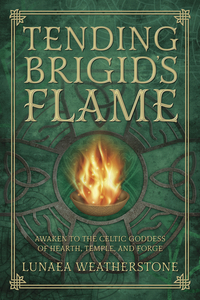
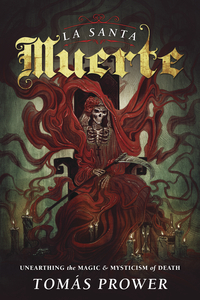
Founded in 1996, the Coalition of Visionary Resources (COVR) is an organization formed by a unique group of businesses that deal in “Visionary Resources,” and who work with and support each other as independent retailers, manufacturers, distributors, wholesalers, and publishers of visionary books, music, and merchandise.
For 2016, the nineteenth annual Visionary Awards, there are some changes.
Most notably, winners are selected by a process of both judging and, for the first time, reader voting. So vote away, and select your favorite titles! Winners and finalists will be announced on June 20.
May 3, 2016
15 Best Tarot Cards for Spell Casting
Readers, please enjoy this guest blog post by Sasha Graham, author of Tarot Diva, 365 Tarot Spreads, and the new 365 Tarot Spells.
 Casting a spell is an enjoyable, mysterious, and empowering process. Spell ingredients are usually selected for the specific energies they innately possess. These energies should aid the caster in attaining her goal. Ingredients are also often selected for the metaphorical impact they offer the sorceress’s psyche. Typical spell ingredients include herbs, foods, stones, gems, and candles colored to reflecting the caster’s intent.
Casting a spell is an enjoyable, mysterious, and empowering process. Spell ingredients are usually selected for the specific energies they innately possess. These energies should aid the caster in attaining her goal. Ingredients are also often selected for the metaphorical impact they offer the sorceress’s psyche. Typical spell ingredients include herbs, foods, stones, gems, and candles colored to reflecting the caster’s intent.
Tarot does not sprout from the ground like English lavender, grow heavily on tree branches like honey crisp apples, nor are they mined from deep within the earth like crystal quartz or tiger’s eye. But tarot cards contain vast treasure troves of power. In fact, cards alone can be used in the casting of a spell. Tarot is a logical accessory for any magical work for four specific reasons:
The cards possess all the meanings and emotions that the caster has accumulated with them. This provides a rich source of personal meaning.
In addition to the caster’s associations, the cards possess the power of the collective consciousness archetype. When the caster moves inside the card, they brush up against the consciousness and energy of others. This also means that the Major Arcana, many of whose symbols and meanings are derived straight from classical art and ancient ideas, harbor excessive wells of usable energy.
The spell caster can explore and journey into the innards of a tarot card and use it as the creative space of your spell’s visualization. You will see the phrase “Enter the arcana” many times in my new book 365 Tarot Spells .
The cards possess the power of symbolic language. Symbolic language speaks readily to the soul of the caster. Words are not needed. This leaves a powerful impression of the psyche and creates a more potent spell.
In writing 365 Tarot Spells, certain cards appeared again and again as the most helpful for specific intentions. Here’s a quick list to help you get started.
Love
The Lovers card
Two of Cups
Ace of Cups
Spirituality
High Priestess
The Hermit card
The Hierophant card
Career
The Justice card
Two of Wands
Eight of Pentacles
Money Matters
Wheel of Fortune
Ten of Pentacles
Ace of Pentacles
Creativity
The Star card
The Empress card
The World card
Our thanks to Sasha for her guest post! For more from Sasha Graham, read her article, “Sacred Space, Tarot, and Your Magical Practice.”
May 2, 2016
Artist Kimberly Kincaid Has Passed
Today we sadly mark the passing of artist Kimberly Kincaid, who beautifully illustrated our 2016 Astrological Calendar. We are grateful to her life lived and beautiful art that will live on.
Here is the full obituary that was published:
Kimberly was born on February 14, 1953 and passed away on Wednesday, April 27, 2016.
Kimberly was a resident of Ogden, Utah at the time of her passing.
She graduated from Downey High School and attended 2 years at Cerritos Jr. College CA.
Graveside services will be held on Tuesday, May 3, 2016 at 11 a.m. at Kaysville Cemetery. Services entrusted to Lindquist’s Layton Mortuary 1867 No. Fairfield Road.
In lieu of flowers please consider donating to the following: LDS Missionary Fund LDS Perpetual Education Fund Humane Society or a local animal shelter.
April 27, 2016
May Day Grounding Spell
The lovely and very wise Sasha Graham has a new book in her 365 series: 365 Tarot Spells: Creating the Magic in Each Day. You can find out more HERE.
This spell is from May 1. I thought I’d include it here now to both preview Sasha’s wonderful work (and hopefully you will want more magic in your life, in which case, you should definitely get this book!) and give you time to prepare your spell.
Today
Today is May Day. As nature flourishes and spring energy abounds, this grounding spell will help you keep rooted as expansion blooms. Repeat as needed.
Ingredients
Temperance
One raw onion
Olive Oil
Water
Fresh feta cheese
Salt, pepper, and thyme
Method, Visualization and Meditation
Onions belongs to the allium family also containing, garlic, chives, scallions, scapes and leeks. Onions are used for spiritual resilience. Feta cheese relates to lunar energy. Thyme is used for courage. Onions relate also to the Temperance card’s flowering yellow pond irises, which also bloom from bulbs. Temperance represents balance, synergy, and alchemy.
You will bake an onion stuffed with cheese, which combines grounding (onion) and feminine lunar connection (cheese).
Set oven to 350 degrees.
Place the Temperance card. She is the synergy between the two cups. Yellow flowers bloom. Follow their green stalks down, past the buzzing bees, spider webs, and scampering ants. Find the circular bulb at its base. Like a lotus flower, the pond iris is rooted in the murky, muddy darkness. Allow yourself to feel the rootedness. In your minds eye, reach for the bulb and retrieve.
Set the oven to 350 degrees. Prepare the onion. Slice the bottom of onion so it will sit upright in the pan. Slice off the top and discard. Scoop out a tablespoon of center onion flesh but do not pull it out yet. Place in pan. Splash with olive oil. Sprinkle salt, pepper and thyme over the onion. Add a touch of water to the pan bottom. Cover pan in foil and pop in oven.
Mix feta with thyme and set aside.
Cook for 45 minutes. Remove from oven, remove scooped flesh and fill with cheese mixture. Return to oven and bake for another 15 minutes.
Eat the onion, while pondering earth connection and the value of being grounded during spiritual work.
Incantation
Root of growth
Onion’s layer
Over this dish
I cast a prayer
Keep me grounded
Centered and still
As I cast and
invoke my will.
April 20, 2016
Why I’m Worried About the Revival of the Old Magick
Readers, please enjoy this guest blog post by Aaron Leitch, author of several books, including Secrets of the Magickal Grimoires, The Angelical Language Volume I and Volume II, and Essential Enochian Grimoire.
When I began my occult path—so many years ago now—there were two things I lamented above all else: 1) that Western culture had abandoned its official belief in magick, and 2) that what little remained of Western occultism had abandoned the Old Magick in favor of post-GD psychological models. I would have to say, in some sense, my entire career as an author/teacher and all-around very public occultist has been dedicated to setting those two things right again. I wanted to live in a community of people who believe in magick—and therefore place real value on what I do, rather than viewing it as a quaint or outright weird hobby. And, of course, I wanted to see the Old Magick revived for Westerners; for us to put away all the mental masturbation and “self-help” and reconnect with Nature as humans should. This seemed like a noble cause, so I set my sails and began my journey.
Yet, as often happens with age and maturity, I have learned and experienced more than my young self had. I have gained new wisdom and a decidedly broader perspective. My ship has sailed, the movement I wanted to start—but, in fact, had already started by the time I joined it—can’t be stopped now. The Old Magick is coming back, via several different channels. Even if I hung up my pen and never wrote another word, it wouldn’t change a thing now. And, now that it is clearly too late to do a damned thing about it, I have serious concerns…
My Neighbors Think I’m Kooky—And Thank the Gods for That!
So, in my youthful rashness I desired to live in a community that truly believes in magick. I wanted my neighbors to respect me for what I do; maybe come to me when they need help, and (in return) make efforts to support me in my art. And, yes, I thought maybe they should fear me a little, too.
Ah, but there’s the problem, folks! Fear. Have you taken a look around the world at communities that have deep-seated beliefs in magick? Oh sure, everyone comes to the local witch when they need help; but just let something go wrong that the people can’t easily explain. Let the weather go bad, or crops fail, or animals get sick, or people suddenly die or go missing. Ah! You can bet your bottom dollar all of those people who came to you for help last week are going to be at your door with torches and pitchforks. It is all going to be your fault, you dirty evil witch!
In Australia, they will still arrest you and lock you in a cage for practicing witchcraft. (Those laws, I believe, are starting to loosen.) But, that is absolutely nothing compared to what would happen to you in certain parts of Africa or the Middle East! There, a mob will drag you out of your home (with help from the police), torture you, and murder you in the most horrific and painful ways possible. Burning alive, stoning, beating, maybe hanging if you’re lucky. The townspeople—the same ones you helped when they were in need, gave medicine to when they were sick, even birthed their babies—will stand around and gleefully cheer as you die. Oh, and they’ll make your children and other family members watch. As a warning.
Now, it is certainly true that violence has been enacted against Pagans and witches here in the West by ignorant losers who can’t even read the Bibles they swing around. Yet, this is not a standard for our culture. And, while it is true that most people, deep down, actually believe in magick—it is not something that is officially believed. That is, you can’t have me arrested because you think I cursed you. You can’t use my occult paraphernalia or writings in a court of law to convict me of a crime. Officially (that is, legally) speaking, magick doesn’t exist and what I do is just a kooky hobby. It makes me weird, and might count against my character in a trial—but I can’t be convicted of being a witch in and of itself.
So my neighbors may or may not believe I’m really a witch with real power. But, whether they do or not, they can’t have me arrested for it. Nor for when they get sick, or lose a job, or a pet vanishes. What I do is protected as a religion, and the fact that I believe I’m a witch and can actually talk to angels and spirits just makes me eccentric—not someone worthy of the gallows or a lynch mob.
Old Magick Practitioners Around the World…Are Generally Assholes
This is one I’ve written about before, so I’ll try for a brief summary here: As social media has spread around the globe, it has brought us into direct contact with many foreign cultures and ideas—and it has also brought the people of those cultures into direct contact with us. Over the years, I’ve encountered a few conjurers from non-Western cultures—such as those from Africa or South America—where magick (specifically the Old Magick) is still an accepted reality. The same places where you might find yourself arrested and executed for the practice. But these meetings don’t often go so well.
You see, when you use magick in a culture that officially accepts its existence, then you are not practicing a mere kooky hobby. No, you’re running a serious business; it is your livelihood. However, it’s not likely you’re going to be the only wichdoctor on the block. You’ll have competition. And we all know what happens when you turn something (anything!) into a commodity and a business—it gets nasty. Competition sets in, and the warlocks go to actual war with one another. To some extent, it’s just about words—you have to declare yourself the biggest and baddest witch in town, and you must convince potential clients that every other shaman in the area is a fraud and a weakling. It’s all about driving customers to your store. And that is exactly why these kinds of witches don’t get along well in online forums. They come across as arrogant frauds, claiming stupid super powers and being nasty to everyone else. (I wrote about this issue previously, as well.) They are assholes—because that’s how their business model works.
But if you think these guys come across bad in an Internet forum, you don’t know them at all! When they are done ranting against all the “false magicians” online, they go back to their usual business of cursing the living hell out of all their competitors. In the West, we call online arguments between Pagans “witch wars”—and that’s cute, because real witch wars are serious business where sometimes people die.
One of the contributors to my Ritual Offerings anthology, Gilberto Strapazon, has written about this subject extensively. He came up in South America among the Candomble communities, where the various houses may or may not be run by corrupt priests, and open warfare between them is all too common. And I’m talking about everything from casting death curses to actual vandalism, burglary, and even murder. And it’s all because each house is attempting to build its “street cred” as the most powerful and feared, to gain clients as well as the ability to intimidate their own communities. If you doubt this is the case for even a moment, just take a look at Haiti—where the government has used Voodoo for generations to subdue and control its citizens.
What Worries Me
Like it or not, if you live in a culture that officially accepts the existence of magick, it’s probably not going to go well for the occultists who live there. Governments that legally recognize magick are generally likely to use it as a tool to subjugate their people. Common people who believe in magick are very likely to jump on the local witch the first time something goes wrong (even after depending on that witch when they needed help). And occultists and occult organizations operating in such cultures have a very high risk of becoming corrupted and evil at their core.
My youthful wishes—for the West to return to the old ways—were probably mostly selfish. I wanted to be respected (and feared—who doesn’t?), and I wanted to be supported and make a living from my expertise. I still want those things! But, now, I’m old enough to see the bigger picture, and better understand the negative baggage that can (will!) come along with that.
Every day I find myself more and more thankful that I live in a post-Enlightenment culture that (at least officially and legally) considers me to be a harmless kook. No police are going to show up at my door because a neighbor caught sight of my Pentagram or heard me chanting in strange tongues inside my house. I have an altar to Bast outside my front door, and it looks to people like a table with some decorations on it—odd for it to be outside, but who cares? I can’t be arrested or prosecuted for my witchcraft—even if I were the type of witch who likes to throw curses at everyone. A court of law will never (at least under current circumstances) accept “witchcraft” as a murder weapon.
So, yes, I still want to see Westerners learn more and more about the Old Magick, and to connect themselves back to Nature as it should be. Yet, I’m now also thrilled to know my government (and even some of my neighbors, at least to a point) believes my standing around in my house in funny clothes and chanting “meaningless” words has no affect on anything other than my own psyche. Western materialism and its centuries of disconnect from magick has actually served as a protective shield for us occultists, and has allowed us to flourish in a way we never could have otherwise.
I only hope, maybe even against all common sense, that we can somehow avoid that negative baggage—arrogance and corruption, all-out magickal (and physical) warfare, arrests, mobs, torture, execution, and worse—that threaten all of us if the old ways are once against accepted by our culture at large.
Stay true, brothers and sisters!
Our thanks to Aaron for his guest post! Visit Aaron Leitch’s author page for more information, including articles and his books.
Llewellyn Publications's Blog
- Llewellyn Publications's profile
- 243 followers


